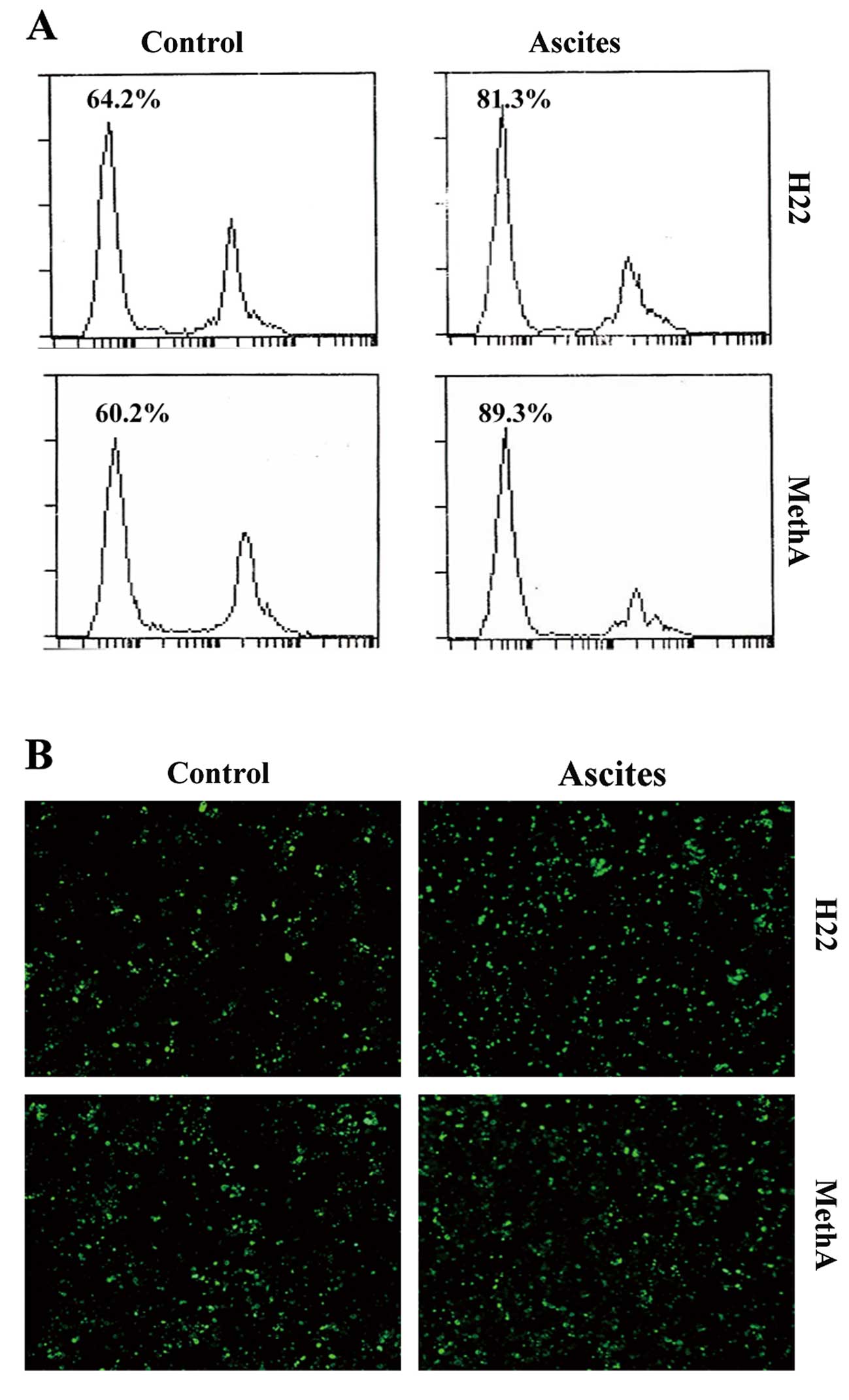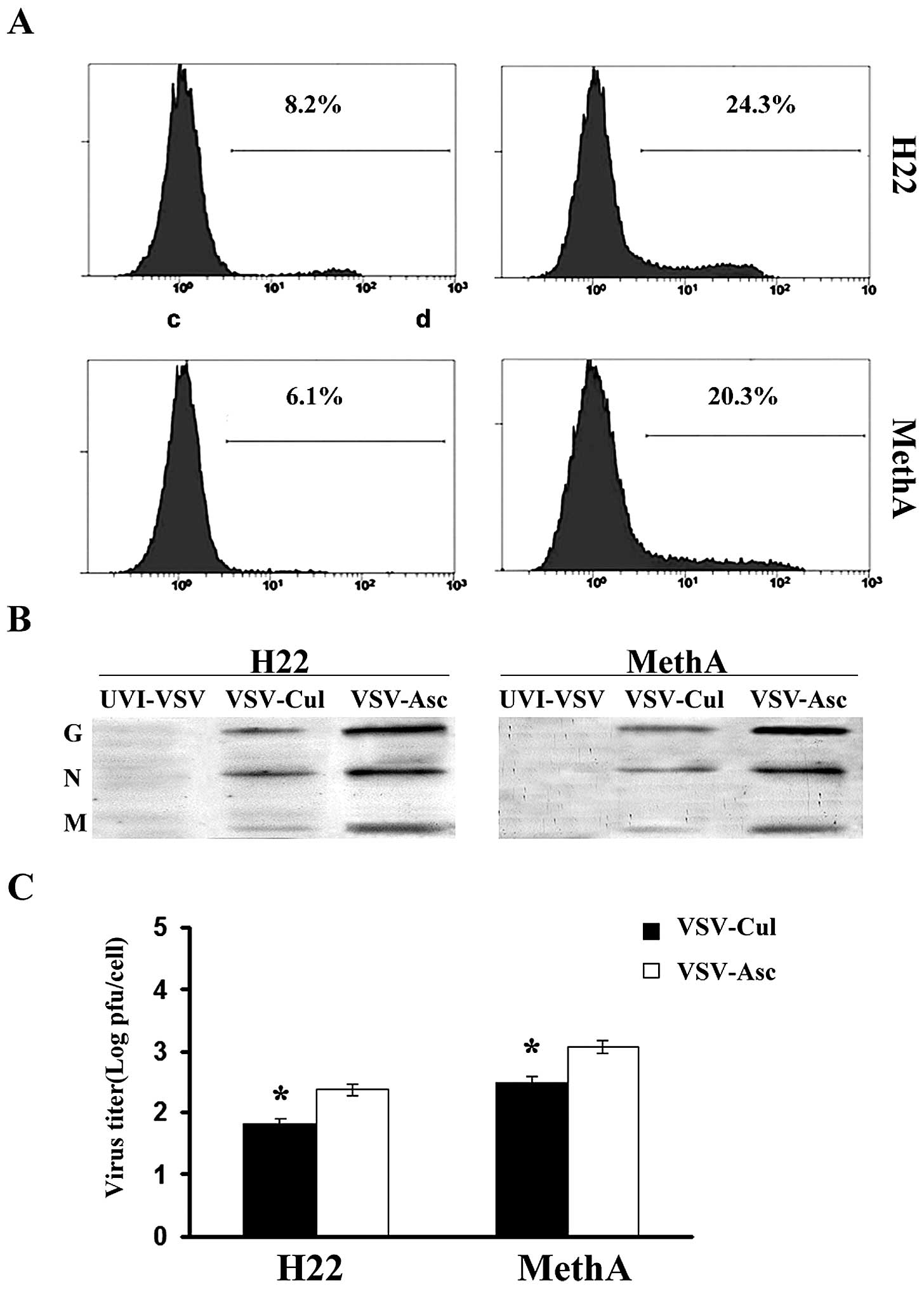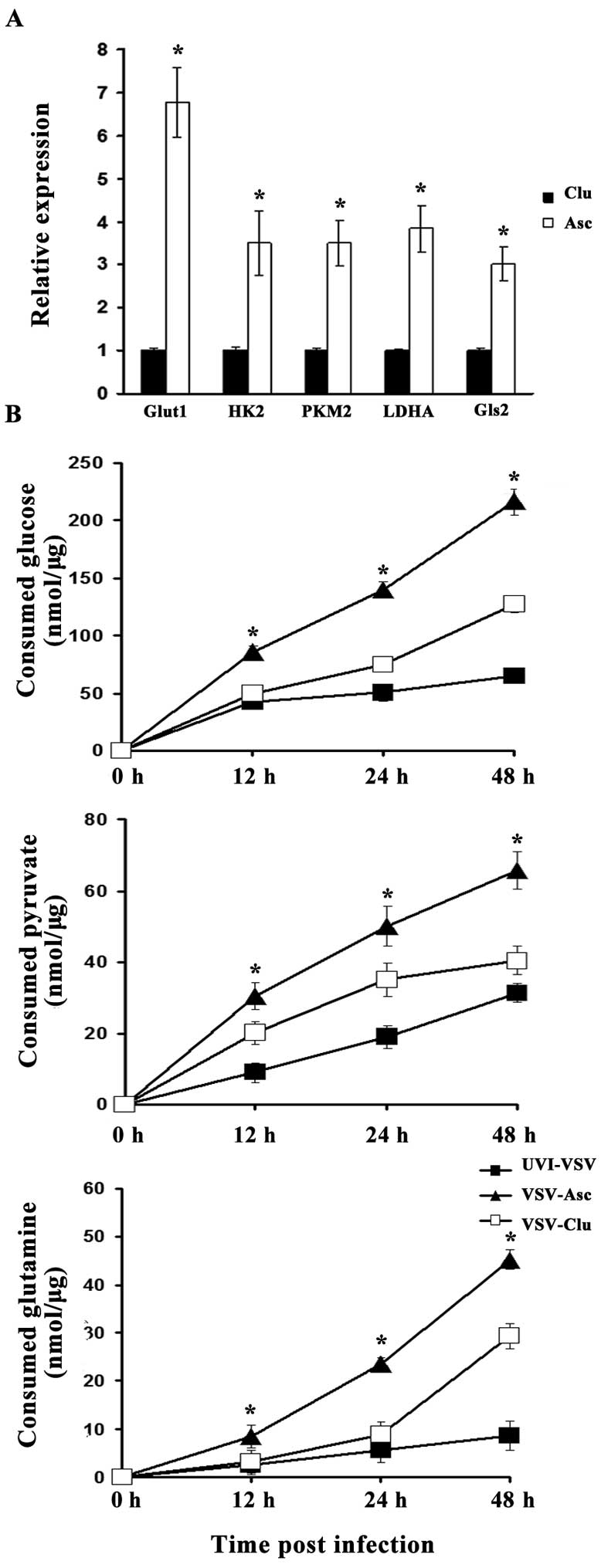|
1
|
Del Monte U: Considerations on factors
influencing the oxygenation of ascites tumours. Eur J Cancer.
5:639–640. 1969. View Article : Google Scholar : PubMed/NCBI
|
|
2
|
Cheng B, Williams M and Chance B: Effects
of glucose, anoxia, and adriamycin on the chemiluminescence of
Ehrlich Ascites cells. FEBS Lett. 160:169–172. 1983. View Article : Google Scholar : PubMed/NCBI
|
|
3
|
Inoue M, Mukai M, Hamanaka Y, Tatsuta M,
Hiraoka M and Kizaka-Kondoh S: Targeting hypoxic cancer cells with
a protein prodrug is effective in experimental malignant ascites.
Int J Oncol. 25:713–720. 2004.PubMed/NCBI
|
|
4
|
Kuemmerle A, Decosterd LA, Buclin T,
Liénard D, Stupp R, Chassot PG, Mosimann F and Lejeune F: A phase I
pharma-cokinetic study of hypoxic abdominal stop-flow perfusion
with gemcitabine in patients with advanced pancreatic cancer and
refractory malignant ascites. Cancer Chemother Pharmacol.
63:331–341. 2009. View Article : Google Scholar
|
|
5
|
Li XF, Carlin S, Urano M, Russell J, Ling
CC and O'Donoghue JA: Visualization of hypoxia in microscopic
tumors by immunofluorescent microscopy. Cancer Res. 67:7646–7653.
2007. View Article : Google Scholar : PubMed/NCBI
|
|
6
|
Driessen A, Landuyt W, Pastorekova S,
Moons J, Goethals L, Haustermans K, Nafteux P, Penninckx F, Geboes
K, Lerut T, et al: Expression of carbonic anhydrase IX (CA IX), a
hypoxia-related protein, rather than vascular-endothelial growth
factor (VEGF), a pro-angiogenic factor, correlates with an
extremely poor prognosis in esophageal and gastric adenocarcinomas.
Ann Surg. 243:334–340. 2006. View Article : Google Scholar : PubMed/NCBI
|
|
7
|
Vander Heiden MG, Cantley LC and Thompson
CB: Understanding the Warburg effect: The metabolic requirements of
cell proliferation. Science. 324:1029–1033. 2009. View Article : Google Scholar : PubMed/NCBI
|
|
8
|
Wise DR, Ward PS, Shay JE, Cross JR,
Gruber JJ, Sachdeva UM, Platt JM, DeMatteo RG, Simon MC and
Thompson CB: Hypoxia promotes isocitrate dehydrogenase-dependent
carboxylation of α-ketoglutarate to citrate to support cell growth
and viability. Proc Natl Acad Sci USA. 108:19611–19616. 2011.
View Article : Google Scholar
|
|
9
|
Metallo CM, Gameiro PA, Bell EL, Mattaini
KR, Yang J, Hiller K, Jewell CM, Johnson ZR, Irvine DJ, Guarente L,
et al: Reductive glutamine metabolism by IDH1 mediates lipogenesis
under hypoxia. Nature. 481:380–384. 2012.
|
|
10
|
Le A, Lane AN, Hamaker M, Bose S, Gouw A,
Barbi J, Tsukamoto T, Rojas CJ, Slusher BS, Zhang H, et al:
Glucose-independent glutamine metabolism via TCA cycling for
proliferation and survival in B cells. Cell Metab. 15:110–121.
2012. View Article : Google Scholar : PubMed/NCBI
|
|
11
|
Fontaine KA, Sanchez EL, Camarda R and
Lagunoff M: Dengue virus induces and requires glycolysis for
optimal replication. J Virol. 89:2358–2366. 2015. View Article : Google Scholar :
|
|
12
|
Munger J, Bajad SU, Coller HA, Shenk T and
Rabinowitz JD: Dynamics of the cellular metabolome during human
cytomegalovirus infection. PLoS Pathog. 2:e1322006. View Article : Google Scholar : PubMed/NCBI
|
|
13
|
Ripoli M, D'Aprile A, Quarato G,
Sarasin-Filipowicz M, Gouttenoire J, Scrima R, Cela O, Boffoli D,
Heim MH, Moradpour D, et al: Hepatitis C virus-linked mitochondrial
dysfunction promotes hypoxia-inducible factor 1 alpha-mediated
glycolytic adaptation. J Virol. 84:647–660. 2010. View Article : Google Scholar :
|
|
14
|
Fontaine KA, Camarda R and Lagunoff M:
Vaccinia virus requires glutamine but not glucose for efficient
replication. J Virol. 88:4366–4374. 2014. View Article : Google Scholar : PubMed/NCBI
|
|
15
|
Xiao L, Hu ZY, Dong X, Tan Z, Li W, Tang
M, Chen L, Yang L, Tao Y, Jiang Y, et al: Targeting Epstein-Barr
virus oncoprotein LMP1-mediated glycolysis sensitizes
nasopharyngeal carcinoma to radiation therapy. Oncogene.
33:4568–4578. 2014. View Article : Google Scholar : PubMed/NCBI
|
|
16
|
Pillet S, Le Guyader N, Hofer T,
NguyenKhac F, Koken M, Aubin JT, Fichelson S, Gassmann M and
Morinet F: Hypoxia enhances human B19 erythrovirus gene expression
in primary erythroid cells. Virology. 327:1–7. 2004. View Article : Google Scholar : PubMed/NCBI
|
|
17
|
Vassilaki N, Kalliampakou KI, Kotta-Loizou
I, Befani C, Liakos P, Simos G, Mentis AF, Kalliaropoulos A, Doumba
PP, Smirlis D, et al: Low oxygen tension enhances hepatitis C virus
replication. J Virol. 87:2935–2948. 2013. View Article : Google Scholar :
|
|
18
|
Aghi MK, Liu TC, Rabkin S and Martuza RL:
Hypoxia enhances the replication of oncolytic herpes simplex virus.
Mol Ther. 17:51–56. 2009. View Article : Google Scholar
|
|
19
|
Haque M, Davis DA, Wang V, Widmer I and
Yarchoan R: Kaposi's sarcoma-associated herpesvirus (human
herpesvirus 8) contains hypoxia response elements: Relevance to
lytic induction by hypoxia. J Virol. 77:6761–6768. 2003. View Article : Google Scholar : PubMed/NCBI
|
|
20
|
Connor JH, Naczki C, Koumenis C and Lyles
DS: Replication and cytopathic effect of oncolytic vesicular
stomatitis virus in hypoxic tumor cells in vitro and in vivo. J
Virol. 78:8960–8970. 2004. View Article : Google Scholar : PubMed/NCBI
|
|
21
|
Stojdl DF, Lichty BD, tenOever BR,
Paterson JM, Power AT, Knowles S, Marius R, Reynard J, Poliquin L,
Atkins H, et al: VSV strains with defects in their ability to
shutdown innate immunity are potent systemic anti-cancer agents.
Cancer Cell. 4:263–275. 2003. View Article : Google Scholar : PubMed/NCBI
|
|
22
|
Nguyên TL, Abdelbary H, Arguello M,
Breitbach C, Leveille S, Diallo JS, Yasmeen A, Bismar TA, Kirn D,
Falls T, et al: Chemical targeting of the innate antiviral response
by histone deacetylase inhibitors renders refractory cancers
sensitive to viral oncolysis. Proc Natl Acad Sci USA.
105:14981–14986. 2008. View Article : Google Scholar : PubMed/NCBI
|
|
23
|
Cave DR, Hendrickson FM and Huang AS:
Defective interfering virus particles modulate virulence. J Virol.
55:366–373. 1985.PubMed/NCBI
|
|
24
|
Zhou Y, Wen F, Zhang P, Tang R and Li Q:
Matrix protein of vesicular stomatitis virus: A potent inhibitor of
vascular endothelial growth factor and malignant ascites formation.
Cancer Gene Ther. 20:178–185. 2013. View Article : Google Scholar : PubMed/NCBI
|
|
25
|
Pourgholami MH, YanCai Z, Lu Y, Wang L and
Morris DL: Albendazole: a potent inhibitor of vascular endothelial
growth factor and malignant ascites formation in H22 tumor-bearing
nude mice. Clin Cancer Res. 12:1928–1935. 2006. View Article : Google Scholar : PubMed/NCBI
|
|
26
|
Li Q, Wei YQ, Wen YJ, Zhao X, Tian L, Yang
L, Mao YQ, Kan B, Wu Y, Ding ZY, et al: Induction of apoptosis and
tumor regression by vesicular stomatitis virus in the presence of
gemcitabine in lung cancer. Int J Cancer. 112:143–149. 2004.
View Article : Google Scholar : PubMed/NCBI
|
|
27
|
Papaconstantinou J and Colowick SP: The
role of glycolysis in the growth of tumor cells. I Effects of
oxamic acid on the metabolism of Ehrlich ascites tumor cells in
vitro. J Biol Chem. 236:278–284. 1961.PubMed/NCBI
|
|
28
|
Guillaumond F, Leca J, Olivares O, Lavaut
MN, Vidal N, Berthezène P, Dusetti NJ, Loncle C, Calvo E, Turrini
O, et al: Strengthened glycolysis under hypoxia supports tumor
symbiosis and hexosamine biosynthesis in pancreatic adenocarcinoma.
Proc Natl Acad Sci USA. 110:3919–3924. 2013. View Article : Google Scholar : PubMed/NCBI
|
|
29
|
Metallo CM, Gameiro PA, Bell EL, Mattaini
KR, Yang J, Hiller K, Jewell CM, Johnson ZR, Irvine DJ, Guarente L,
et al: Reductive glutamine metabolism by IDH1 mediates lipogenesis
under hypoxia. Nature. 481:380–384. 2012.
|
|
30
|
Scott DA, Richardson AD, Filipp FV,
Knutzen CA, Chiang GG, Ronai ZA, Osterman AL and Smith JW:
Comparative metabolic flux profiling of melanoma cell lines: Beyond
the Warburg effect. J Biol Chem. 286:42626–42634. 2011. View Article : Google Scholar : PubMed/NCBI
|
|
31
|
Delgado T, Carroll PA, Punjabi AS,
Margineantu D, Hockenbery DM and Lagunoff M: Induction of the
Warburg effect by Kaposi's sarcoma herpe svirus is required for the
maintenance of latently infected endothelial cel ls. Proc Natl Acad
Sci USA. 107:10696–10701. 2010. View Article : Google Scholar
|
|
32
|
Vastag L, Koyuncu E, Grady SL, Shenk TE
and Rabinowitz JD: Divergent effects of human cytomegalovirus and
herpes simplex virus-1 on cellular metabolism. PLoS Pathog.
7:e10021242011. View Article : Google Scholar : PubMed/NCBI
|
|
33
|
Diamond DL, Syder AJ, Jacobs JM, Sorensen
CM, Walters KA, Proll SC, McDermott JE, Gritsenko MA, Zhang Q, Zhao
R, et al: Temporal proteome and lipidome profiles reveal hepatitis
C virus-associated reprogramming of hepatocellular metabolism and
bioenergetics. PLoS Pathog. 6:e10007192010. View Article : Google Scholar : PubMed/NCBI
|
|
34
|
Ramière C, Rodriguez J, Enache LS, Lotteau
V, André P and Diaz O: Activity of hexokinase is increased by its
interaction with hepatitis C virus protein NS5A. J Virol.
88:3246–3254. 2014. View Article : Google Scholar : PubMed/NCBI
|
|
35
|
Loisel-Meyer S, Swainson L, Craveiro M,
Oburoglu L, Mongellaz C, Costa C, Martinez M, Cosset FL, Battini
JL, Herzenberg LA, et al: Glut1-mediated glucose transport
regulates HIV infection. Proc Natl Acad Sci USA. 109:2549–2554.
2012. View Article : Google Scholar : PubMed/NCBI
|
|
36
|
Gonnella R, Santarelli R, Farina A,
Granato M, D'Orazi G, Faggioni A and Cirone M: Kaposi sarcoma
associated herpesvirus (KSHV) induces AKT hyperphosphorylation,
bort-ezomib-resistance and GLUT-1 plasma membrane exposure in THP-1
monocytic cell line. J Exp Clin Cancer Res. 32:792013. View Article : Google Scholar
|
|
37
|
McArdle J, Schafer XL and Munger J:
Inhibition of calmodulin-dependent kinase kinase blocks human
cytomegalovirus-induced glycolytic activation and severely
attenuates production of viral progeny. J Virol. 85:705–714. 2011.
View Article : Google Scholar :
|
|
38
|
Radsak KD and Weder D: Effect of
2-deoxy-D-glucose on cytomegalovirus-induced DNA synthesis in human
fibroblasts. J Gen Virol. 57:33–42. 1981. View Article : Google Scholar : PubMed/NCBI
|
|
39
|
Courtney RJ, Steiner SM and
Benyesh-Melnick M: Effects of 2-deoxy-D-glucose on herpes simplex
virus replication. Virology. 52:447–455. 1973. View Article : Google Scholar : PubMed/NCBI
|
|
40
|
Balachandran S, Porosnicu M and Barber GN:
Oncolytic activity of vesicular stomatitis virus is effective
against tumors exhibiting aberrant p53, Ras, or myc function and
involves the induction of apoptosis. J Virol. 75:3474–3479. 2001.
View Article : Google Scholar : PubMed/NCBI
|
|
41
|
Balachandran S, Roberts PC, Kipperman T,
Bhalla KN, Compans RW, Archer DR and Barber GN: Alpha/beta
interferons potentiate virus-induced apoptosis through activation
of the FADD/Caspase-8 death signaling pathway. J Virol.
74:1513–1523. 2000. View Article : Google Scholar : PubMed/NCBI
|
|
42
|
Liu HL and Chen J: Oncolytic virus as an
agent for the treatment of malignant ascites. Cancer Biother
Radiopharm. 24:99–102. 2009. View Article : Google Scholar : PubMed/NCBI
|
|
43
|
Hadaschik BA, Zhang K, So AI, Fazli L, Jia
W, Bell JC, Gleave ME and Rennie PS: Oncolytic vesicular stomatitis
viruses are potent agents for intravesical treatment of high-risk
bladder cancer. Cancer Res. 68:4506–4510. 2008. View Article : Google Scholar : PubMed/NCBI
|



















